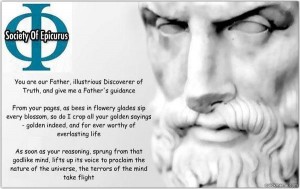The following is the “Isle of the Blessed” portion of Lucian’s True Story, which is available in its entirety at Gutenberg.org. True Story has continued relevance to our generation because it is a parody and commentary on “fake news”, on popular resistance against empirical thinking, and on people’s frequent inability to discern truth from falsehood.
The King of the Isle, Rhadamanthys, was believed to be the Underworld judge of the souls from the East (due to being famed for his inflexible integrity), and Lucian was making an ethnic joke here concerning his own eastern/Syrian origins. Although this work is a comedy, it’s not without educational value. In it, Lucian places before our eyes an Epicurean paradise, complete with a city of Seven Gates and the Elysian fields.
Within a while after many islands appeared, and near unto them, upon our left hand, stood Phello, the place whereunto they were travelling, which was a city seated upon a mighty great and round cork. Further off, and more towards the right hand, we saw five other islands, large and mountainous, in which much fire was burning; but directly before us was a spacious flat island, distant from us not above five hundred furlongs: and approaching somewhat near unto it, a wonderful fragrant air breathed upon us, of a most sweet and delicate smell, such as Herodotus, the story-writer, saith ariseth out of Arabia the happy, consisting of a mixture of roses, daffodils, gillyflowers, lilies, violets, myrtles, bays, and blossoms of vines: such a dainty odoriferous savour was conveyed unto us.
Being delighted with this smell, and hoping for better fortunes after our long labours, we got within a little of the isle, in which we found many havens on every side, not subject to overflowing, and yet of great capacity, and rivers of clear water emptying themselves easily into the sea, with meadows and herbs and musical birds, some singing upon the shore, and many upon the branches of trees, a still and gentle air compassing the whole country. When pleasant blasts gently stirred the woods the motion of the branches made a continual delightsome melody, like the sound of wind instruments in a solitary place: a kind of clamour also was heard mixed with it, yet not tumultuous nor offensive, but like the noise of a banquet, when some do play on wind instruments, some commend the music, and some with their hands applaud the pipe, or the harp. All which yielded us so great content that we boldly entered the haven, made fast our ship and landed, leaving in her only Scintharus and two more of our companions behind us. Passing along through a sweet meadow we met with the guards that used to sail about the island, who took us and bound us with garlands of roses (which are the strictest bands they have), to be carried to their governor: from them we heard, as we were upon the way, that it was the island of those that are called blessed, and that Rhadamanthus was governor there, to whom we were brought and placed the fourth in order of them that were to be judged.
The first trial was about Ajax, the son of Telamon, whether he were a meet man to be admitted into the society of the Heroes or not: the objections against him were his madness and the killing of himself: and after long pleading to and fro, Rhadamanthus gave this sentence, that for the present he should be put to Hippocrates, the physician of Cos, to be purged with helleborus, and upon the recovery of his wits to have admittance.
The second was a controversy of love, Theseus and Menelaus contending which had the better right to Helen; but Rh ad am an thus gave judgment on Menelaus’ side, in respect of the manifold labours and perils he had incurred for that marriage’ sake, whereas Theseus had wives enough beside to live withal—as the Amazon, and the daughters of Minos. The third was a question of precedency between Alexander, the son of Philip, and Hannibal, the Carthaginian, in which Alexander was preferred, and his throne placed next to the elder Cyrus the Persian.
In the fourth place we appeared, and he demanded of us what reason we had, being living men, to take land in that sacred country, and we told him all our adventures in order as they befell us: then he commanded us to stand aside, and considering upon it a great while, in the end proposed it to the benchers, which were many, and among them Aristides the Athenian, surnamed the Just: and when he was provided what sentence to deliver, he said that for our busy curiosity and needless travels we should be accountable after our death; but for the present we should have a time limited for our abode, during which we should feast with the Heroes and then depart, prefixing us seven months’ liberty to conclude our tarriance, and no more. Then our garlands fell off from us of themselves, and we were set loose and led into the city to feast with the blessed.
The city was all of gold, compassed with a wall made of the precious stone smaragdus, which had seven gates, every one cut out of a whole piece of timber of cinnamon-tree: the pavement of the city and all the ground within the walls was ivory: the temples of all the gods are built of beryl, with large altars made all of one whole amethyst, upon which they offer their sacrifices: about the city runneth a river of most excellent sweet ointment, in breadth an hundred cubits of the larger measure, and so deep that a man may swim in it with ease. For their baths they have great houses of glass, which they warm with cinnamon: and their bathing-tubs are filled with warm dew instead of water. Their only garments are cobwebs of purple colour; neither have they any bodies, but are intactile and without flesh, a mere shape and presentation only: and being thus bodiless, they yet stand, and are moved, are intelligent, and can speak: and their naked soul seemeth to wander up and down in a corporal likeness: for if a man touch them not he cannot say otherwise, but that they have bodies, altogether like shadows standing upright, and not, as they are, of a dark colour. No man waxeth any older there than he was before, but of what age he comes thither, so he continues. Neither is there any night with them, nor indeed clear day: but like the twilight towards morning before the sun be up, such a kind of light do they live in. They know but one season of the year which is the spring, and feel no other wind but Zephyrus. The region flourisheth with all sorts of flowers, and with all pleasing plants fit for shade: their vines bear fruit twelve times a year, every month once: their pomegranate-trees, their apple-trees, and their other fruit, they say, bear thirteen times in the year, for in the month called Minous they bear twice. Instead of wheat their ears bear them loaves of bread ready baked, like unto mushrooms. About the city are three hundred three-score and five wells of water, and as many of honey, and five hundred of sweet ointment, for they are less than the other. They have seven rivers of milk and eight of wine.
They keep their feast without the city in a field called Elysium, which is a most pleasant meadow, environed with woods of all sorts, so thick that they serve for a shade to all that are invited, who sit upon beds of flowers, and are waited upon, and have everything brought unto them by the winds, unless it be to have the wine filled: and that there is no need of: for about the banqueting place are mighty great trees growing of clear and pure glass, and the fruit of those trees are drinking-cups and other kind of vessels of what fashion or greatness you will: and every man that comes to the feast gathers one or two of those cups, and sets them before him, which will be full of wine presently, and then they drink. Instead of garlands the nightingales and other musical birds gather flowers with their beaks out of the meadows adjoining, and flying over their heads with chirping notes scatter them among them.
They are anointed with sweet ointment in this manner: sundry clouds draw that unguent out of the fountains and the rivers, which settling over the heads of them that are at the banquet, the least blast of wind makes a small rain fall upon them like unto a dew. After supper they spend the time in music and singing: their ditties that are in most request they take out of Homer’s verses, who is there present himself and feasteth among them, sitting next above Ulysses: their choirs consist of boys and virgins, which were directed and assisted by Eunomus the Locrian, and Arion the Lesbian, and Anacreon, and Stesichorus, who hath had a place there ever since his reconcilement with Helena. As soon as these have done there enter a second choir of swans, swallows, and nightingales; and when they have ended, the whole woods ring like wind-instruments by the stirring of the air.
But that which maketh most for their mirth are two wells adjoining to the banqueting place, the one of laughter, the other of pleasure: of these every man drinks to begin the feast withal, which makes them spend the whole time in mirth and laughter.
I will also relate unto you what famous men I saw in that association. There were all the demigods, and all that fought against Troy, excepting Ajax the Locrian: he only, they told me, was tormented in the region of the unrighteous. Of barbarians there was the elder and the younger Cyrus, and Anacharsis the Scythian, Zamolxis the Thracian, and Numa the Italian. There was also Lycurgus the Lacedæmonian, and Phocion and Tellus the Athenians, and all the Wise Men, unless it were Periander.
I also saw Socrates, the son of Sophroniscus, prattling with Nestor and Palamedes, and close by him stood Hyacinthus the Lacedæmonian, and the gallant Narcissus and Hylas, and other beautiful and lovely youths, and for aught I could gather by him he was far in love with Hyacinthus, for he discoursed with him more than all the rest: for which cause, they said, Rhadamanthus was offended at him, and often threatened to thrust him out of the island if he continued to play the fool in that fashion, and not give over his idle manner of jesting, when he was at their banquet. Only Plato was not present, for they said he dwelled in a city framed by himself, observing the same rule of government and laws as he had prescribed for them to live under.
Aristippus and Epicurus are prime men amongst them, because they are the most jovial good fellows and the best companions. Diogenes the Sinopean was so far altered from the man he was before that he married with Lais the harlot, and was many times so drunk that he would rise and dance about the room as a man out of his senses. Æsop the Phrygian served them for a jester. There was not one Stoic in company but were still busied in ascending the height of virtue’s hill: and of Chrysippus we heard that it was not lawful for him by any means to touch upon the island until he have the fourth time purged himself with helleborus. The Academics, they say, were willing enough to come, but that they yet are doubtful and in suspense, and cannot comprehend how there should be any such island; but indeed, I think, they were fearful to come to be judged by Rhadamanthus, because themselves have abolished all kind of judgment: yet many of them, they say, had a desire, and would follow after those that were coming hither, but were so slothful as to give it over because they were not comprehensive, and therefore turned back in the midst of their way.
These were all the men of note that I saw there; and amongst them all Achilles was held to be the best man, and next to him Theseus. For their manner of venery and copulation thus it is: they couple openly in the eyes of all men, both with females and male kind, and no man holds it for any dishonesty. Only Socrates would swear deeply that he accompanied young men in a cleanly fashion, and therefore every man condemned him for a perjured fellow: and Hyacinthus and Narcissus both confessed otherwise for all his denial.
The women there are all in common, and no man takes exception at it, in which respect they are absolutely the best Platonists in the world: and so do the boys yield themselves to any man’s pleasure without contradiction.
After I had spent two or three days in this manner, I went to talk with Homer the poet, our leisure serving us both well, and to know of him what countryman he was, a question with us hard to be resolved, and he said he could not certainly tell himself, because some said he was of Chios, some of Smyrna, and many to be of Colophon; but he said indeed he was a Babylonian, and among his own countrymen not called Homer but Tigranes, and afterwards living as an hostage among the Grecians, he had therefore that name put upon him. Then I questioned him about those verses in his books that are disallowed as not of his making, whether they were written by him or not, and he told me they were all his own, much condemning Zenodotus and Aristarchus, the grammarians, for their weakness in judgment.
When he had satisfied me in this, I asked him again why he began the first verse of his poem with anger: and he told me it fell out so by chance, not upon any premeditation. I also desired to know of him whether he wrote his Odysseys before his Iliads, as many men do hold: but he said it was not so. As for his blindness which is charged upon him, I soon found it was far otherwise, and perceived it so plainly that I needed not to question him about it.
Thus was I used to do many days when I found him idle, and would go to him and ask him many questions, which he would give me answer to very freely: especially when we talked of a trial he had in the court of justice, wherein he got the better: for Thersites had preferred a bill of complaint against him for abusing him and scoffing at him in his Poem, in which action Homer was acquitted, having Ulysses for his advocate.
About the same time came to us Pythagoras the Samian, who had changed his shape now seven times, and lived in as many lives, and accomplished the periods of his soul. The right half of his body was wholly of gold; and they all agreed that he should have place amongst them, but were doubtful what to call him, Pythagoras or Euphorbus. Empedocles also came to the place, scorched quite over, as if his body had been broiled upon the embers; but could not be admitted for all his great entreaty.
The time passing thus along, the day of prizes for masteries of activity now approached, which they call Thanatusia. The setters of them forth were Achilles the fifth time, and Theseus the seventh time. To relate the whole circumstance would require a long discourse, but the principal points I will deliver. At wrestling Carus, one of the lineage of Hercules, had the best, and wan the garland from Ulysses. The fight with fists was equal between Arius the Ægyptian, who was buried at Corinth, and Epius, that combated for it. There was no prize appointed for the Pancratian fight: neither do I remember who got the best in running: but for poetry, though Homer without question were too good for them all, yet the best was given to Hesiodus. The prizes were all alike, garlands plotted of peacocks’ feathers.
As soon as the games were ended, news came to us that the damned crew in the habitation of the wicked had broken their bounds, escaped the gaolers, and were coming to assail the island, led by Phalaris the Agrigentine, Busyris the Ægyptian, Diomedes the Thracian, Sciron, Pituocamptes, and others: which Rhadamanthus hearing, he ranged the Heroes in battle array upon the sea-shore, under the leading of Theseus and Achilles and Ajax Telamonius, who had now recovered his senses, where they joined fight; but the Heroes had the day, Achilles carrying himself very nobly. Socrates also, who was placed in the right wing, was noted for a brave soldier, much better than he was in his lifetime, in the battle at Delium: for when the enemy charged him, he neither fled nor changed countenance: wherefore afterwards, in reward of his valour, he had a prize set out for him on purpose, which was a beautiful and spacious garden, planted in the suburbs of the city, whereunto he invited many, and disputed with them there, giving it the name of Necracademia.
Then we took the vanquished prisoners, and bound them, and sent them back to be punished with greater torments.
This fight was also penned by Homer, who, at my departure, gave me the book to show my friends, which I afterwards lost and many things else beside: but the first verse of the poem I remember was this: “Tell me now, Muse, how the dead Heroes fought.”
When they overcome in fight, they have a custom to make a feast with sodden beans, wherewith they banquet together for joy of their victory: only Pythagoras had no part with them, but sat aloof off, and lost his dinner because he could not away with beans.
Six months were now passed over, and the seventh halfway onwards, when a new business was begot amongst us. For Cinyras the son of Scintharus, a proper tall young man, had long been in love with Helena, and it might plainly be perceived that she as fondly doted upon him, for they would still be winking and drinking one to another whilst they were a-feasting, and rise alone together, and wander up and down in the wood. This humour increasing, and knowing not what course to take, Cinyras’ device was to steal away Helena, whom he found as pliable to run away with him, to some of the islands adjoining, either to Phello, or Tyroessa, having before combined with three of the boldest fellows in my company to join with them in their conspiracy; but never acquainted his father with it, knowing that he would surely punish him for it.
Being resolved upon this, they watched their time to put it in practice: for when night was come, and I absent (for I was fallen asleep at the feast), they gave a slip to all the rest, and went away with Helena to shipboard as fast as they could. Menelaus waking about midnight, and finding his bed empty, and his wife gone, made an outcry, and calling up his brother, went to the court of Rhadamanthus.
As soon as the day appeared, the scouts told them they had descried a ship, which by that time was got far off into the sea. Then Rhadamanthus set out a vessel made of one whole piece of timber of asphodelus wood, manned with fifty of the Heroes to pursue after them, which were so willing on their way, that by noon they had overtaken them newly entered into the milky ocean, not far from Tyroessa, so near were they got to make an escape. Then took we their ship and hauled it after us with a chain of roses and brought it back again.
Rhadamanthus first examined Cinyras and his companions whether they had any other partners in this plot, and they confessing none, were adjudged to be tied fast by the privy members and sent into the place of the wicked, there to be tormented, after they had been scourged with rods made of mallows. Helena, all blubbered with tears, was so ashamed of herself that she would not show her face. They also decreed to send us packing out of the country, our prefixed time being come, and that we should stay there no longer than the next morrow: wherewith I was much aggrieved and wept bitterly to leave so good a place and turn wanderer again I knew not whither: but they comforted me much in telling me that before many years were past I should be with them again, and showed me a chair and a bed prepared for me against the time to come near unto persons of the best quality.
Then went I to Rhadamanthus, humbly beseeching him to tell me my future fortunes, and to direct me in my course; and he told me that after many travels and dangers, I should at last recover my country, but would not tell me the certain time of my return: and showing me the islands adjoining, which were five in number, and a sixth a little further off, he said, Those nearest are the islands of the ungodly, which you see burning all in a light fire, but the other sixth is the island of dreams, and beyond that is the island of Calypso, which you cannot see from hence. When you are past these, you shall come into the great continent, over against your own country, where you shall suffer many afflictions, and pass through many nations, and meet with men of inhuman conditions, and at length attain to the other continent.
When he had told me this, he plucked a root of mallows out of the ground, and reached it to me, commanding me in my greatest perils to make my prayers to that: advising me further neither to rake in the fire with my knife, nor to feed upon lupins, nor to come near a boy when he is past eighteen years of age: if I were mindful of this, the hopes would be great that I should come to the island again.
Then we prepared for our passage, and feasted with them at the usual hour, and next morrow I went to Homer, entreating him to do so much as make an epigram of two verses for me, which he did: and I erected a pillar of berylstone near unto the haven, and engraved them upon it. The epigram was this:
Lucian, the gods’ belov’d, did once attain
To see all this, and then go home again.
After that day’s tarrying, we put to sea, brought onward on our way by the Heroes, where Ulysses closely coming to me that Penelope might not see him, conveyed a letter into my hand to deliver to Calypso in the isle of Ogygia. Rhadamanthus also sent Nauplius, the ferryman, along with us, that if it were our fortune to put into those islands, no man should lay hands upon us, because we were bent upon other employments.
Further Reading:
The Surprising Origins of Sci-Fi






